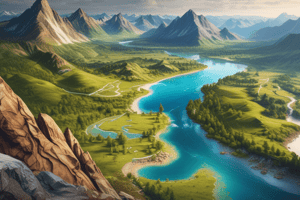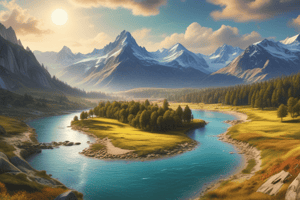Podcast
Questions and Answers
What do life zones describe?
What do life zones describe?
- The geographic location of different ecosystems
- The layers of the Earth's atmosphere
- The distribution of plant species in a given area
- Organisms living under certain climatic conditions (correct)
How can studying seasonal changes help in agriculture?
How can studying seasonal changes help in agriculture?
- By analyzing rock formations
- By understanding ocean currents
- By exploring space weather patterns
- By predicting regional crop harvests (correct)
Why is physical geography essential?
Why is physical geography essential?
- To improve standard of living (correct)
- To learn about outer space
- To study ancient civilizations
- To understand human psychology
In what way can studying how living creatures adapt to changing climates aid conservation efforts?
In what way can studying how living creatures adapt to changing climates aid conservation efforts?
What type of ecosystems do different soils support?
What type of ecosystems do different soils support?
What aspect of physical geography focuses on Earth's natural environments and landscapes?
What aspect of physical geography focuses on Earth's natural environments and landscapes?
How do features like mountains, valleys, and plateaus affect the distribution of plants, animals, and humans?
How do features like mountains, valleys, and plateaus affect the distribution of plants, animals, and humans?
What does studying atmospheric conditions in physical geography help geographers predict?
What does studying atmospheric conditions in physical geography help geographers predict?
How does water movement through evaporation, condensation, rainfall, and rivers impact habitats?
How does water movement through evaporation, condensation, rainfall, and rivers impact habitats?
What process leads to the formation of soils according to the text?
What process leads to the formation of soils according to the text?
What role do ocean currents play in coastal ecosystems according to the text?
What role do ocean currents play in coastal ecosystems according to the text?
Flashcards are hidden until you start studying
Study Notes
Physical Geography
Physical geography is a branch of geography concerned with understanding Earth's natural environments and landscapes, including weather patterns, climate, soil types, plant growth, animal behavior, rocks, and landforms. It spans a wide range of scales, from microscopic details to global systems. Here are some aspects of physical geography:
Landscapes and Terrains
Physical geography examines features of the earth's surface, including mountains, valleys, plains, hills, cliffs, and plateaus. These features affect the distribution of plants, animals, and humans, influencing where cities develop, where agriculture thrives, and where resources are located.
Atmosphere and Oceans
Understanding atmospheric conditions such as temperature, humidity, pressure, wind, and precipitation helps geographers predict weather cycles and extreme events like tornadoes, hurricanes, floods, droughts, wildfires, and earthquakes. Ocean currents, ocean temperatures, and sea levels also impact coastal ecosystems.
Water Cycle
Water movement through evaporation, condensation, rainfall, and flow in rivers creates unique ecological niches and supports diverse habitats. Studying water cycle dynamics allows scientists to forecast floods, droughts, and man-made disasters like dam failures.
Soils
Soils form from rock breakdown and contain organic matter produced by living things. Different soils support distinct ecosystems, allowing crops to grow in nutrient-poor sand or alkaline desert, and creating niche habitats for specific species.
Life Zones
Life zones describe the organisms that live under certain climatic conditions. Studying how living creatures adapt to changing climates aids conservation efforts, urban planning, and agriculture.
Climate and Weather
Recognizing seasonal changes and studying average annual temperatures and precipitation helps predict regional crop harvests and prepare for shortages caused by changing climate patterns.
In summary, physical geography is essential for understanding the earth's structure, its atmosphere, oceans, and lifecycle. This knowledge enables us to better manage resources sustainably, anticipate hazards, improve our standard of living, and promote economic development.
Studying That Suits You
Use AI to generate personalized quizzes and flashcards to suit your learning preferences.




